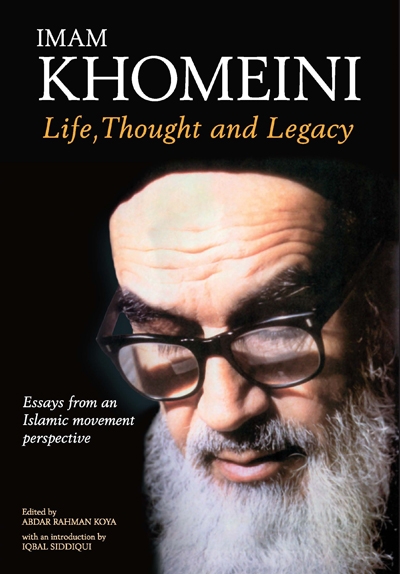Imam Khomeini: Life, Thought and Legacy

Author(s): Abdar Rahman Koya
Publisher: Islamic Book Trust
Published on: Jumada' al-Ula', 1430 2009-05
ISBN: 978-967-5062-24-7 (hbk.), 978-967-5062-25-4 (pbk.)
No. of Pages: xv + 203
Editor’s Foreword
by Abdar Rahman Koya
This year marks the twentieth anniversary of the death of Imam Ruhullah Khomeini, the man who led the third great revolution of the twentieth century and the only one which has the potential to be repeated elsewhere in the world during the twenty-first century. There can be no doubt that the Islamic revolution of Iran in 1979 permanently changed the political landscape of the Muslim world and redefined relations between the West and Islam in a way that no other event in recent history, not even the attacks on New York and the Pentagon in September 2001, has done. Until his death on June 3, 1989, and even for years after, Imam Khomeini was a constant presence in the international media, as a hate figure for most in the West and a hero for many in the Muslim world. But he lived at a time when the Western media, never friendly to Muslims, were almost unchallenged and were at the peak of their power to influence global opinion. It was also before the emergence of the internet, which has subsequently done so much to undermine the hegemony of the Western media.
Despite this, twenty years after his death, his statements and actions continue to mould Muslim debates, both inside and outside Iran, and across all schools of thought of Islam, even among Muslims who have little knowledge of him and would deny being influenced by him. But there is a new generation of Muslims now who are too young to have more than the vaguest recollection of his impact on the world in the late 1970s and 1980s, and even many of those old enough to remember those turbulent years have been influenced by the years of propaganda against him since his death; a death which, it should be remembered, was followed by a massive funeral attended by tens of millions of Iranians and mourning all around the Muslim world.
The twentieth anniversary of Imam Khomeini’s death seems, therefore, an appropriate time to publish a compilation of articles on Imam Khomeini, his work and thought, and their impact on contemporary history, in the hope that some Muslims at least may be reminded of his unique contribution to the history of Islam. While there is a plethora of writings on Imam Khomeini and his thoughts, we have confined our selections largely to articles published in the news magazine Crescent International. This Toronto-based news magazine has provided unparalleled coverage of the Islamic Revolution in Iran and the Islamic movement since 1980, based on the contributions of seasoned observers and expert analysts of contemporary Islamic affairs.
We have also included a biographical essay by Professor Hamid Algar, of the University of California, Berkeley, who is undoubtedly the world’s foremost expert on Imam Khomeini’s life and thought; a speech by Shaykh Saeed Bahmanpour, of the Islamic College for Advanced Studies, London; and an introduction by Iqbal Siddiqui, former editor of Crescent International, written especially for this volume. Our thanks are due to all of them for allowing us to use their material, as well as to Zafar Bangash, the director of the Institute of Contemporary Islamic Thought (ICIT) and editor of Crescent International, for agreeing to our using the Crescent material in this humble volume.
The articles have been minimally edited to suit a book form and are organised into two broad themes: ‘Life, leadership and influence’ and ‘Intellectual dimension and thought’. Where possible, footnotes are given; in addition, a glossary at the beginning of the book helps readers not familiar with Arabic and Farsi terminologies, as well as Shi‘i concepts. A chronology of events at the end of the book will provide one with a general idea of the chain of events mentioned throughout the book. The publication of this book, it is hoped, will lay the foundation for any one interested in current affairs or modern Islamic political thought to study events based on sound understanding of historical facts and evolution of events. It serves not only as a reminder of the life and thought of this great personality – whose influence in history was destined to be of epic proportions even during his lifetime – but also as a reintroduction and refresher about great events that had shaped around us in recent past, its implications laid bare for all to see, probably for a long time to come.
Abdar Rahman Koya,
Islamic Book Trust,
May 2009.
